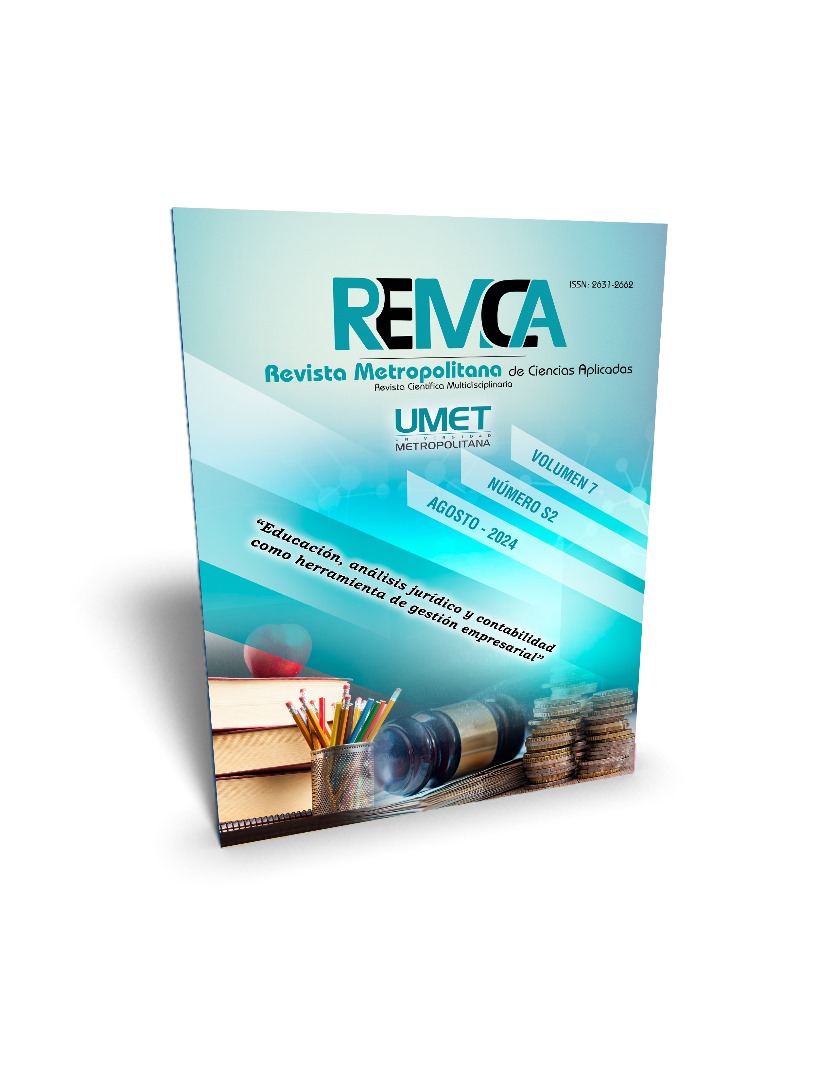Legal and jurisprudential analysis of indigenous justice. Its intercultural interpretation
DOI:
https://doi.org/10.62452/j8j6mb49Keywords:
Due process, interculturality, intercultural interpretation , indigenous justiceAbstract
This article is focused on the legal and jurisprudential analysis of indigenous justice from its intercultural interpretation. For its development, the general objective has been to review this type of justice from doctrine, regulation and jurisprudence and the need for its intercultural interpretation in the judicial framework in Ecuador. In that sense, a theoretical examination of this figure is carried out, its recognition in the Constitution of the Republic is reviewed, in infra-constitutional norms such as the Organic Law of Jurisdictional Guarantees, the Organic Code of the Judicial Function and the Convention on Indigenous Peoples and Tribal Organization of the ILO, which is part of the legal system, based on the plurinational and intercultural nature of the Ecuadorian State. Likewise, a study of ruling No. 113-14-SEP-CC issued by the Constitutional Court is carried out with the purpose of identifying the aspects to be taken into account to interpret, interculturally, those cases that reach the justice bodies where has applied indigenous justice, taking into account their particularities. This will allow us to reinforce and expand knowledge on the subject and understand how this legal institution operates, an issue that is currently controversial within the academy and the jurisdictional bodies in the country.
Downloads
References
Aguadelo, M. (2016). Debido proceso. Señal.
Brito, M. (2017). Pluralismo jurídico: un camino festivo de celebración de la diversidad. Defensa y justicia, 1(9), 17-18. http://www.defensayjusticia.gob.ec/wp-content/uploads/2021/06/REVISTA-Defensa-Y-Justicia-No.-9.pdf
Corte Constitucional del Ecuador. (2014). Sentencia No. 113-14-SEP-CC, No. 0731-10-EP. https://biblioteca.defensoria.gob.ec/bitstream/37000/485/1/sentencia%20lacocha.pdf
Croda, J. R., & Abad, E. (2018). Modelos de investigación cualitativa y cuantitativa y su aplicación en el estudio del derecho. Revista Universita Ciencia, 4(12), 13-24. https://universita.ux.edu.mx/universita-ciencia/article/view/308
Cruz, E. (2017). Estado plurinacional,interculturalidad y autonomía indígena: Una reflexión sobre los casos de Bolivia y Ecuador. Via Iuris, 1(8), 55-71. https://www.redalyc.org/articulo.oa?id=273929754005
Díaz, E., & Antúnez, A. (2017). El conflicto de competencia en la justicia indígena del Ecuador. Revista Temas Socio Jurídicos, 35(70), 95-117. https://www.corteidh.or.cr/tablas/r35496.pdf
Ecuador. Asamblea Nacional . (2009a). Código Orgánico de la Función Judicial . Suplemento del Registro Oficial No. 544. https://biblioteca.defensoria.gob.ec/handle/37000/3363
Ecuador. Asamblea Nacional Constituyente. (2008). Constitución de la República del Ecuador. Registro Oficial No 449. https://www.oas.org/juridico/pdfs/mesicic4_ecu_const.pdf
Ecuador. Asamblea Nacional. (2009b). Ley Orgánica de Garantías Jurisdiccionales y Control Constitucional. Registro Oficial Suplemento 52. https://www.oas.org/juridico/PDFs/mesicic4_ecu_org2.pdf
Flores, D. (2016). La Justicia Indígena y sus conflictos con el Derecho Ordinario. Fundación regional.
Griffith, J. (2016). ¿Qué es el pluralismo jurídico? Revista de Pluralismo Jurídico y Derecho, 1(25), 1-55. https://doi.org/DOI: 10.1080/07329113.1986.10756387
Grijalva, A. (2017). Justicia indígena en el Ecuador. CEP.
Hernández, R., Fernández, C., & Baptista, P. (2018). Metodología de la Investigación. Segunda edición. Mc Graw Hill.
Hoyos, A. (2017). El Debido Proceso. Tercera edición. Temos.
Jiménez, H., ViIteri, B., & Mosquera, M. (2021). La justicia indigena y la violación de los principios contenmplados en la Constitución del Ecuador. Revista Universidad y Sociedad, 13(2), 176-183. http://scielo.sld.cu/pdf/rus/v13n2/2218-3620-rus-13-02-176.pdf
Martínez, P. (2016). El mètodo de estudio de caso: estrategia metodológica de la investigación científica. Pensamiento & Gestión, 3(20), 165-193. https://www.redalyc.org/pdf/646/64602005.pdf
Organización Internacional del Trabajo. (1998). Convenio sobre Pueblos Indígenas y Tribales. Registro Oficial 206. https://normlex.ilo.org/dyn/normlex/es/f?p=NORMLEXPUB:12100:0::NO::P12100_INSTRUMENT_ID:312314
Pospisil, L. (2018). La antropologia de la ley: Teoria comparada. tercera edición. Harper & Row.
Poveda, C., Tiban, L., & Ilaquiche, R. (2019). Jurisdicción Indígena en la Constitución de la República del Ecuador. Cevallos.
Ruíz, E., Álvarez, D., & Vilela, W. (2022). El debido proceso en la justicia indígena ecuatoriana para prevenir la vulneración de los derechos humanos. Polo del Conocimiento, 7(8), 1548-1574. https://doi.org/DOI: 10.23857/pc.v7i8
Soto, V. (2021). Conceptos de plurinacionalidad e interculturalidad. Biblioteca del Congreso Nacional de Chile.
Tibán, L. (2018). El Derecho Indígena y su relación con la Justicia Ordinaria. Segunda edición. CEP.
Vanderlinden, J. (2017). Pluralismo Juridico. Universidad de Bruselas.
Downloads
Published
Issue
Section
License
Copyright (c) 2024 Alejandra Estefanía Ramírez-Albán, Nicole Dominique Rodríguez-Maisincho, Ximena Viviana Ramírez-Albán, Diego Armando García-Moreno, Jenny Alexandra Lara-Rosas (Autor/a)

This work is licensed under a Creative Commons Attribution-NonCommercial-ShareAlike 4.0 International License.
Authors who publish in Revista Metropolitana de Ciencias Aplicadas (REMCA), agree to the following terms:
1. Copyright
Authors retain unrestricted copyright to their work. Authors grant the journal the right of first publication. To this end, they assign the journal non-exclusive exploitation rights (reproduction, distribution, public communication, and transformation). Authors may enter into additional agreements for the non-exclusive distribution of the version of the work published in the journal, provided that acknowledgment of its initial publication in this journal is given.
© The authors.
2. License
The articles are published in the journal under the Creative Commons Attribution-NonCommercial-ShareAlike 4.0 International License (CC BY-NC-SA 4.0). The terms can be found at: https://creativecommons.org/licenses/by-nc-sa/4.0/deed.en
This license allows:
- Sharing: Copying and redistributing the material in any medium or format.
- Adapting: Remixing, transforming, and building upon the material.
Under the following terms:
- Attribution: You must give appropriate credit, provide a link to the license, and indicate if any changes were made. You may do this in any reasonable manner, but not in any way that suggests the licensor endorses or sponsors your use.
- NonCommercial: You may not use the material for commercial purposes.
- ShareAlike: If you remix, transform, or build upon the material, you must distribute your creation under the same license as the original work.
There are no additional restrictions. You may not apply legal terms or technological measures that legally restrict others from doing anything the license permits.




